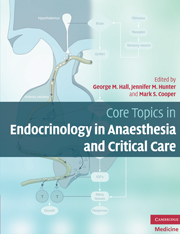Book contents
- Core Topics in Endocrinology in Anaesthesia and Critical Care
- Core Topics in Endocrinology in Anaesthesia and Critical Care
- Copyright page
- Contents
- Contributors
- Foreword
- Preface
- Section 1 Perioperative care of patients with endocrine disease
- Section 2 Perioperative care of the patient with diabetes mellitus
- Section 3 Endocrine disorders in the critically ill
- Chapter 13 The endocrine response to critical illness
- Chapter 14 Tight glucose control using intensive insulin therapy in the critically ill
- Chapter 15 Glucocorticoids in the critically ill
- Chapter 16 Diabetic hyperglycaemic crises
- Chapter 17 Thyroid dysfunction and critical care
- Chapter 18 Disorders of sodium balance
- Index
Chapter 17 - Thyroid dysfunction and critical care
from Section 3 - Endocrine disorders in the critically ill
Published online by Cambridge University Press: 06 July 2010
- Core Topics in Endocrinology in Anaesthesia and Critical Care
- Core Topics in Endocrinology in Anaesthesia and Critical Care
- Copyright page
- Contents
- Contributors
- Foreword
- Preface
- Section 1 Perioperative care of patients with endocrine disease
- Section 2 Perioperative care of the patient with diabetes mellitus
- Section 3 Endocrine disorders in the critically ill
- Chapter 13 The endocrine response to critical illness
- Chapter 14 Tight glucose control using intensive insulin therapy in the critically ill
- Chapter 15 Glucocorticoids in the critically ill
- Chapter 16 Diabetic hyperglycaemic crises
- Chapter 17 Thyroid dysfunction and critical care
- Chapter 18 Disorders of sodium balance
- Index
Summary
Keywords
- Type
- Chapter
- Information
- Core Topics in Endocrinology in Anaesthesia and Critical Care , pp. 168 - 174Publisher: Cambridge University PressPrint publication year: 2010



